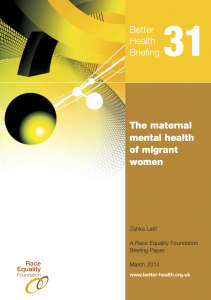
The impact of ethnicity on treatment and engagement with mental health services is well documented. John Baker’s recent Mental Elf post highlights the damning evidence behind murmurs of institutional racism within the NHS that just won’t go away: certain ethnic groups consistently experience lower quality care and poor outcomes across a wide range of health conditions and services. Maternity services in particular struggle to meet the physical and psychological needs of an increasingly diverse group of users and migrant women are now voting with their feet and often avoid antenatal care altogether, with potentially devastating physical and psychological consequences for themselves and their babies. This is an important public health concern, not least because higher fertility rates among migrant women suggest that they ‘should’ be one of the main users of maternity services.
The opposite is in fact true and underrepresentation of ethnic minorities and migrant women in maternity services is a long-standing issue. However, it cannot simply be explained away by the catch-alls of prejudice and stigma. Many migrant women who ultimately shun maternity services do so not necessarily following a bad experience but, rather, having simply been charged for care that was not relevant (NHS maternity charges were introduced in August 2011).
As part of its Better Health briefing collection, the Race Equality Foundation has published a briefing paper on the maternal mental health of migrant women, and its key messages provide daunting insight into the complexities of managing the mental health needs of this so-called ‘super-diverse’ group of potentially highly vulnerable women.
Latif explores the subtleties of diversity by examining the impact of changing migration patterns and the superdiversity of migrant women on uptake of UK maternal mental health services. Many vulnerable migrant women have complex psychological needs and this is especially true of asylum seekers and refugees, often coming from particularly stressful backgrounds involving gender-specific forms of persecution and trauma, such as marital rape and female genital mutilation. Arriving in an unfamiliar country, with limited social support, risk factors for the development of perinatal mental health problems in all migrant women are high. In addition, Latif considers how maternal mental health care providers can develop services which meet their needs in ways which go beyond a focus on overcoming language barriers.
Key messages
- Pregnant and early postnatal migrant women are a far more heterogeneous group than previously thought
- Migrant women experiencing maternal mental health related illnesses face practical barriers and cultural factors which may prevent them from seeking help
- Maternal mental health related services tend to be focused on helping migrant women to overcome practical barriers at the risk of obscuring cultural factors and attitudes to mental health
- Further research is urgently needed to acquire accurate data on the needs of the newer migrant population which can then inform the development of appropriate services as well as culturally competent care
- Maternal mental health related practitioners will need to acquire new knowledge and skills in order to deliver effective services to a super diverse cohort of pregnant and early postnatal migrant women

Arriving in an unfamiliar country, with limited social support, risk factors for the development of perinatal mental health problems in all migrant women are high
Key cultural factors
- A knowledge gap exists regarding the impact of cultural factors on maternal mental health disorders
- Existing mental health support is not always appropriate, e.g. diagnostic tools are often tailored to meet the needs of Western populations and depend upon accurate self-reporting
- Women’s own cultural beliefs about depression and stigma can prevent them from disclosing their feelings to practitioners
Key practical barriers
- Language difficulties and lack of social support
- Living in hardship and not knowing how to access services
- Many service providers do not offer specific service provision for migrant women and where services do exist, help focuses on overcoming language barriers
Discussion
This briefing paper rightly stresses the urgent need for tailored and culturally sensitive antenatal mental health provision. Arguably, this is what should be on offer for all pregnant women, regardless of their ethnic status, and herein lies a certain limitation of the paper. Whilst the mental health needs of migrant women are indeed urgent and largely unmet, this is true for pretty much all pregnant women. The paper would benefit from contextualising this issue and acknowledging the fundamental problem of migrants entering a system that already struggles to meet the mental health needs of pregnant women, irrespective of their ethnic background.
Despite being a clinical priority (with revised NICE guidelines due out later this year), the simple fact is that psychological wellbeing in pregnancy is chronically under assessed and treatment provision is patchy. Midwives (who are not necessarily mental health professionals) are expected to ask two mental health questions which the mother has to answer honestly and accurately. Admitting to a concern about your mental health is problematic at the best of times; factor in language, cultural and individual differences, a time-constrained meeting with a midwife you may never have seen before and a decidedly uneven spread of perinatal mental health treatment referral options, and the psychological safety net starts to look decidedly threadbare.
Maternity research is undergoing a fundamental shift in focus, something I have alluded to in a previous Mental Elf post. Increased research and clinical attention are being given to antenatal wellbeing in an attempt to avoid the potentially catastrophic consequences of antenatal depression and anxiety and services are slowly but surely taking note of critical evidence which demands identification and prevention of antenatal mental health disorders. It is widely recognised that key to this preventative approach is the provision of tailored and inclusive antenatal care that takes an active stance in encouraging and enabling holistic emotional and physical wellbeing in all mothers, regardless of their ethnic background.

Antenatal mental health is a growing UK clinical and research priority, which affects all pregnant women
Links
Entitlement to free NHS maternity care for women from abroad (PDF). Maternity Action, August 2011.
Latif, Z. The maternal mental health of migrant women. Race Equality Foundation, Better Health Briefing Paper 31, March 2014.
Prevention in Mind: All Babies Count (PDF). NSPCC, June 2013.
Antenatal and postnatal mental health: quick reference guide (PDF). NICE, February 2007.
Healthtalkonline is an award-winning website which features information on a range of illnesses and other health-related issues based on seeing and hearing people’s real life experiences. Healthtalkonline have produced a collection of video, text and audio examples of what it is like to experience maternity care.
Featured image appears courtesy of: udeyismail / Shutterstock.com



The mental health of migrant mothers: focus needed on attitudes to mental health, not language barriers: The i… http://t.co/ajTCth4uT3
Today @nikkinewhouse discusses the recent @raceequality report on the maternal mental health of migrant women http://t.co/QfrSFNEULT
My latest post for @Mental_Elf on the @raceequality report on migrant maternal mental health. http://t.co/NWf5bOncTw
Mental Elf: The mental health of migrant mothers: focus needed on attitudes to mental health, not language barriers http://t.co/x9jLJD0Xb8
The mental health of migrant mothers: focus needed on attitudes to mental health, not language… http://t.co/A2EQsTyogL
Antenatal mental health is a growing UK clinical and research priority, which affects all pregnant women http://t.co/QfrSFNEULT
RT @nikkinewhouse: Migrant maternal #mentalhealth – focus on attitudes not language barriers. My latest post for @Mental_Elf http://t.co/NW…
The importance of antenatal care & mental health of mothers who are migrants – post at @Mental_Elf by @nikkinewhouse http://t.co/B1Y6F0uAXv
Arriving in an unfamiliar country, risk factors for perinatal mental health problems in all migrant women are high http://t.co/QfrSFNEULT
@marielita007 Antenatal mental health is a growing UK clinical and research priority, which affects pregnant women http://t.co/mbeGcJzpC2“
The key cultural factors & practical barriers when caring for migrant women with perinatal mental health problems: http://t.co/QfrSFNEULT
Don’t miss: The mental health of migrant mothers: focus needed on attitudes to mental health, not language barriers http://t.co/QfrSFNEULT
The mental health of migrant mothers: focus needed on attitudes to MH, not language barriers http://t.co/GQoNhBfFQZ via @Mental_Elf
Focus needed on attitudes to #mentalhealth of migrant mothers (U.K.)http://t.co/fgkN3uHaPl @Mental_Elf #sdoh #maternalhealth
What does good antenatal mental health care look like? http://t.co/QfrSFNEULT
How can midwives be better supported in caring for the mental health of their patients? http://t.co/QfrSFNEULT @nikkinewhouse
RT @nikkinewhouse: What does latest advice regarding home and MLU birth mean for migrant mothers? See @Mental_Elf http://t.co/KtB0iRJfv4
Midwives! Are ethnic minorities & migrant women under-represented in antenatal mental health care? http://t.co/QfrSFNEULT @nikkinewhouse
@consideredview @MidwivesRCM Your pic is fab! How are migrant women represented in antenatal mental health care? http://t.co/NWf5bOncTw
Vgood piece @nikkinewhouse I will tweet link @MidwivesRCM @salhogg @JonesAko @Katie_DeFreitas @GailRCM @ssardarizadeh http://t.co/E3N7gBJkqL